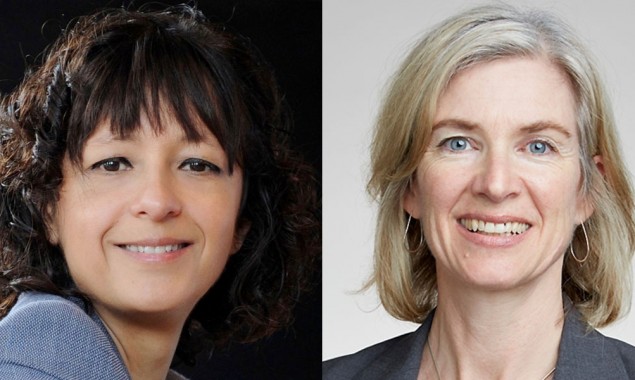
Nobel Prize
The 2020 Nobel Prize in Chemistry has been awarded to Emmanuelle Charpentier and Jennifer A. Doudna “for the development of a method for genome editing.
According to the details, the French scientist Emmanuelle Charpentier and American Jennifer A. Doudna have won the Nobel Prize in chemistry for developing a method of genome editing known as CRISPR.
Using these, researchers can change the DNA of animals, plants and microorganisms with extremely high precision. This technology has had a revolutionary impact on the life sciences, is contributing to new cancer therapies and may make the dream of curing inherited diseases come true.
Researchers need to modify genes in cells if they are to find out about life’s inner workings. This used to be time-consuming, difficult and sometimes impossible work. Using the CRISPR/Cas9 genetic scissors, it is now possible to change the code of life over the course of a few weeks.
“There is enormous power in this genetic tool, which affects us all. It has not only revolutionised basic science, but also resulted in innovative crops and will lead to ground-breaking new medical treatments,” says Claes Gustafsson, chair of the Nobel Committee for Chemistry.
As so often in science, the discovery of these genetic scissors was unexpected. During Emmanuelle Charpentier’s studies of Streptococcus pyogenes, one of the bacteria that cause the most harm to humanity, she discovered a previously unknown molecule, tracrRNA. Her work showed that tracrRNA is part of bacteria’s ancient immune system, CRISPR/Cas, that disarms viruses by cleaving their DNA.
Charpentier published her discovery in 2011. The same year, she initiated a collaboration with Jennifer Doudna, an experienced biochemist with vast knowledge of RNA. Together, they succeeded in recreating the bacteria’s genetic scissors in a test tube and simplifying the scissors’ molecular components so they were easier to use.
In an epoch-making experiment, they then reprogrammed the genetic scissors. In their natural form, the scissors recognise DNA from viruses, but Charpentier and Doudna proved that they could be controlled so that they can cut any DNA molecule at a predetermined site. Where the DNA is cut it is then easy to rewrite the code of life.
Since Charpentier and Doudna discovered the CRISPR/Cas9 genetic scissors in 2012 their use has exploded. This tool has contributed to many important discoveries in basic research, and plant researchers have been able to develop crops that withstand mould, pests and drought. In medicine, clinical trials of new cancer therapies are underway, and the dream of being able to cure inherited diseases is about to come true. These genetic scissors have taken the life sciences into a new epoch and, in many ways, are bringing the greatest benefit to humankind.
The recipients were announced Wednesday in Stockholm by Goran Hansson, Secretary-General of the Royal Swedish Academy of Sciences.
The prestigious award comes with a gold medal and prize money of 10 million krona (more than $1.1 million), courtesy of a bequest left more than a century ago by the prize’s creator, Swedish inventor Alfred Nobel. The amount was increased recently to adjust for inflation.
BREAKING NEWS:
The 2020 #NobelPrize in Chemistry has been awarded to Emmanuelle Charpentier and Jennifer A. Doudna “for the development of a method for genome editing.” pic.twitter.com/CrsnEuSwGD— The Nobel Prize (@NobelPrize) October 7, 2020
Nobel Prize Physics 2020
Reinhard Genzel, Andrea Ghez, and Roger Penrose together won the 114th Nobel prize in physics for their breakthroughs in understanding the mysteries of cosmic black holes.
The award is worth 10m Swedish kronor (£870,000), which will be shared among the winners, with half going to Penrose and the other half shared between Genzel and Ghez.
BREAKING NEWS:
The Royal Swedish Academy of Sciences has decided to award the 2020 #NobelPrize in Physics with one half to Roger Penrose and the other half jointly to Reinhard Genzel and Andrea Ghez. pic.twitter.com/MipWwFtMjz— The Nobel Prize (@NobelPrize) October 6, 2020
Reinhard Genzel and Andrea Ghez, were honoured for their work in which they turned telescopes on our own galaxy and discovered there is a supermassive black hole in the centre of the Milky Way.
Penrose, a British mathematical physicist based at the University of Oxford, won the prize for using ingenious mathematical tools to prove that the formation of black holes is predicted by Einstein’s general theory of relativity.
Nobel Prize Physiology 2020
Nobel Committee awarded the prize for physiology and medicine to Americans Harvey J. Alter and Charles M. Rice and British-born scientist Michael Houghton for discovering the liver-ravaging hepatitis C virus.
Read More News On
Catch all the Lifestyle News, Breaking News Event and Latest News Updates on The BOL News
Download The BOL News App to get the Daily News Update & Follow us on Google News.




